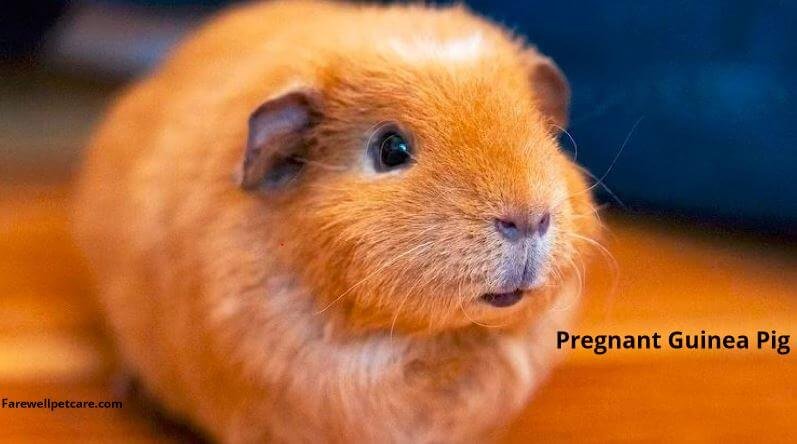The guinea pig pregnancy lasts between 59-72 days, with an average of 63 days. During this time, the gestation undergoes vital transitions. You should understand the three pregnant guinea pig stages discussed in this article and be able to help through each pregnancy stage.
Generally, pregnant guinea pig stages follow specific timelines. The first three weeks make the early gestation stage, and the cavy is not showing prominent pregnancy signs. Then there’s the mid-pregnancy stage from weeks 4-6 and the final gestation stage from weeks seven and above.
Of course, there’s the last week before the guinea pig delivers. At this time, her body is huge and looks amazingly cute. Stay tuned to know the pregnant guinea pig stages and how to ensure proper care until she delivers and beyond.
Pregnant Guinea Pig Stages You Need to Know

Tracking the gestation stages of your guinea pig is vital if you must provide precise care in time. You want to follow along week by week to avoid any potential risks that are pregnancy-related.
Here are the vital pregnant guinea pig stages:
1. Early Gestation (From Weeks 1-3)
Early gestation is the first stage of a guinea pig’s pregnancy. This stage begins from the first week to the third or fourth week.
You can barely notice any pregnancy signs at this stage. That’s why you should visit the vet for a medical diagnosis so you are sure that your cavy is pregnant.
Otherwise, the piggy will simply behave and look like nothing is happening in her body. She will still be active, running around with cage mates and even responding positively to your calls.
However, here are the early signs of pregnancy in guinea pigs to help you:
- Increased appetite: Once your guinea pig suddenly begins to eat more than usual, you should investigate pregnancy. She will also drink more water.
- An increased liking for vegetables and fruits: The guinea pig is also more interested in fruits and vegetables, which are particularly rich in vitamin C and calcium. This is a sign of the formation of babies in the womb.
- Mating: If the guinea pigs have stopped mating, the best guess would be that the female has already conceived. Because mating is nature’s call—you’ll know that your guinea pig is now pregnant when she stops it.
Make sure to supply the piggy with enough food so she doesn’t starve and deplete her fat reserves. Provide enough water as well.
Find Out: Is My Guinea Pig Dead or in Shock? (Best Ways to Differentiate)
2. Mid-Pregnancy (Week 4-7)
A guinea pig’s pregnancy becomes apparent as she approaches the mid-gestation period. She looks physically larger because the fetuses are now growing to occupy more space. The enlargement of the belly depends on the number of pups inside.
She could carry up to 14 pups in her belly! But don’t fret because the average guinea pig litter size is 3 pups.
Mid-pregnancy is the stage where she gains a lot of weight. You should weigh her weight regularly – preferably weekly – to ensure it’s within a desired range (Normally, a healthy pregnant guinea pig will have almost double her usual weight). Too much weight could indicate obesity—a dangerous condition for pregnant guinea pigs.
Since the average weight for female guinea pigs is between 2 to 2.5 pounds (907.19 to 1,133.98 g), the average weight of a pregnant guinea pig should range between 4 to 5 pounds (1,814.37 to 2,267.96 g).
You can prevent obesity by feeding your pregnant guinea pig moderately. Encourage your guinea pig to exercise to gather more strength and tone down excess weight.
The following signs will be prominent in a pregnant guinea pig at this stage:
- Abdomen and hindquarters enlarge significantly
- Babies are prominently moving in the abdomen. You can feel and even see the movements on touching the piggy.
- The guinea pig is lethargic and spends most time resting.
When handling a guinea pig in this stage of pregnancy, be careful how you hold her. You should ensure gentle handling. Support her body well by the hips and put her in a comfortable posture.
Moreover, you should reduce the frequency of handling a pregnant guinea pig to avoid unnecessary harm.
Also Read: Guinea Pig Death Process: 5 Transitioning Stages
3. Final Gestation Period (Weeks 8-10)

From week seven onwards, your guinea pig is in the last stage of her pregnancy journey.
You can see babies’ movement in the belly. When you touch the belly, you can even feel each distinct part of the now-ready-to-be-born pups.
The sow appears swollen, especially in the mid-body – it’s almost roundish. She is not moving a lot and could even avoid you being there for her.
At this point, it’s recommended to remove other cavies from the cage. The pregnant guinea pig wants a calm, quiet, and private environment, which is impossible when other guinea pigs are making all sorts of messes around her.
The week before birth, ensure you prepare for her babies well. Provide soft bedding, enhance privacy, and clean the cage regularly to prevent pathogen buildup.
You can enhance privacy by covering one side of the cage with an old towel to prevent too much light from entering the cage.
At What Stage Can You Tell a Guinea Pig Is Pregnant?
You can tell a guinea pig is pregnant precisely in the mid-pregnancy stage because the pregnancy signs are apparent – both physical and behavioral. However, you can also tell about pregnancy from the first gestation stage by observing whether the guinea pigs are still mating or have stopped.
For new guinea pig parents, telling whether a guinea pig is pregnant can be challenging, especially in the early weeks. Usually, the guinea pig behaves like she’s not pregnant – she’s active, eats normally, and acts like others in the cage.
However, this stage of ‘hiding’ the pregnancy can be revealed. Whether you are an experienced piggy owner or new and confused, visit the vet for an accurate pregnancy diagnosis.
The vet will surely tell you how many days or weeks your beloved furry friend has been pregnant. That said, mid-pregnancy and late pregnancy stages are easy to know because you can see a swollen abdomen and most other signs.
How Many Months Does It Take for a Guinea Pig to Give Birth?

A guinea pig takes approximately 2 months and 3 weeks to give birth. But on average, that would be two months—usually a long gestation period compared to other small mammals like squirrels and rabbits. However, guinea pigs give birth to fully developed younglings.
The length of the pregnancy depends on how many pups the guinea pig conceived.
If the litter is large, the guinea pig takes fewer months to give birth. If she has only a few pups – say 2 to 4 pups – the pregnancy may go all the way to day 72, the very last day in the gestation range of guinea pigs.
The broad accepted range among experts for the guinea pig pregnancy duration is 58-72 days. The average is 63 days. So, your guinea pig should fall within the mentioned range.
There could be complications if pups come too early or too late. It’s essential to inform your vet about your guinea pig’s pregnancy progress.
How Long Are Guinea Pigs Pregnant for First Time?
Guinea pigs are pregnant for 59-72 days or about two months, even when it’s their first time carrying the pregnancy. Typically, the gestation period doesn’t change due to a guinea pig’s age. It’s a natural timeline for all guinea pigs.
Notably, the period can vary from one guinea pig to another. These variations could result from the guinea pig’s health, regular diet, genetic makeup, and the environment around her.
Nonetheless, you should closely monitor your first-time guinea pig mom to ensure she’s healthy enough to carry the pregnancy until the last date. Remember, it’s her first time having a pregnancy.
Regular veterinary care is recommended to check on her overall progress. Also, feed her a healthy diet with a rich vitamin C and calcium content to supply her fetuses.
Final Thoughts
Understanding the pregnant guinea pig stages is crucial for any responsible owner.
From the gestation period’s excitement to the anticipation of labor, and finally the joy of welcoming adorable pups into the world, these stages are filled with awe-inspiring moments. By staying informed and prepared, you can provide the best care and support for your expectant guinea pig.
Remember, each stage is a precious chapter in the miraculous journey of life, reminding us of the incredible resilience and beauty found in the animal kingdom. So, keep a close eye on your pregnant guinea pig, cherish these stages, and provide the necessary care for safe delivery.

